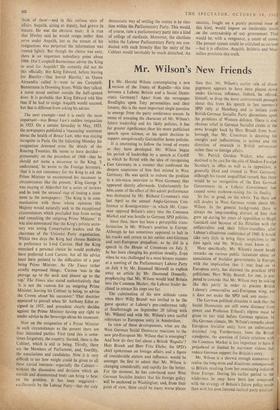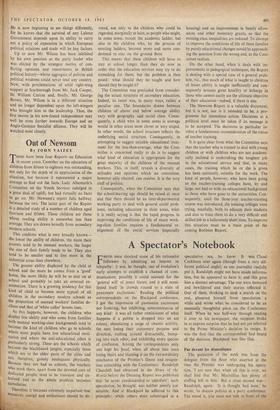Mr. Wilson's New Friends
T s Mr. Harold Wilson contemplating a new 'version of the Treaty of Rapallo—this time between a Labour Britain and a Social Demo- cratic Germany? Apart from the newspaper floodlights upon Tory personalities and their futures, this is the most important single question to emerge from the party conference season. In terms of assessing the character of Mr. Wilson's future leadership and his likely policies, it has far greater significance.than his more publicised speech upon science, -or His quiet decision to support unequivocally Gaitskellite home policies.
It is interesting to follow the trend of events as they have developed. Mr. Wilson began his period of leadership by a speech at Cardiff in which he flirted with the idea of recognising . East Germany in a manner that confirmed the deepest suspicions of him that existed in West Germany. He was quick to redress the position in a television interview to West Germany that appeared shortly afterwards. Unfortunately for him, some of the effect of this adroit performance was destroyed by Mr. Richard Crossman's visit last April to the annual Anglo-German Con- ference at Koenigswinter—in which Mr. Cross- man opposed Britain's entry into the Common. Market and was hostile to German SPD policies.
Since then, there has been a perceptible trans- formation in Mr. Wilson's position in Europe. Although he has sometimes appeared to halt in his tracks and return to his earlier anti-German and anti-European prejudices, as he did in a speech in the House of Commons on July 3, he has been changing his position steadily. Even when he was challenged in a most bizarre manner at a meeting of the Parliamentary Labour Party on July 4 by Mr. Emanuel Shinwell to explain away an article by Mr. Desmond Donnelly, prophesying that Mr. Wilson would lead Britain into the Common Market, the Labour leader de- clined to retrace his steps too far.
The culmination of his new attitude came when Herr Willy Brandt was invited to be the guest speaker at Labour's pre-conference rally at Scarborough on September 20 (along with Mr. Wilson) and with Mr. Wilson's own tactful references to European unity in Amsterdam.
In view of these developments, what are the West German Social Democrat reactions to the new pro-European Mr. Wilson that is emerging? And how do they feel about a British 'Rapallo'? Herr Brandt and Herr Fritz Ehrler, the SPD's chief spokesman on foreign affairs and a figure of considerable stature and influence, would be amongst the first to admit that Mr. Wilson is changing considerably and rapidly for the better. For the moment, he has convinced most West German Socialist leaders that his foreign policy will be anchored to Washington; and, from their point of view, there could be many worse places than that. Mr. Wilson's earlier talk of disen- gagement appears to have been played down under German influence. Indeed, he offered, himself, to drop the more controversial passages about this from his speech to last summer's SPD rally at Hamburg and to initiate joint British-German Socialist Party discussions upon the problems of Western defence. There is also obvious relief in German SocialiSt circles at the news brought back by Herr Brandt from Sear- borough that Mr. Crossman. is devoting his energies and indiscretions to science and the direction of research in British universities rather than to foreign affairs.
Mr. Patrick Gordon Walker, who seems destined to be cast for the role of Shadow Foreign Secretary in office as well as in Opposition, is generally liked and trusted in West Germany, although his recent unqualified remark that there would be no recognition of the East German Government by a Labatt. Government has caused some eyebrow-raising for its finality.
So far, so good, on the whole. Yet there are still doubts in West German minds about Mr. Wilson. In the general background, there is always the long-standing distrust of him that grew up during his years of opposition to Hugh Gaitskell and because of his flirtation with the unilateralists and their fellow-travellers after Labour's disastrous conference of 1960. It would take very little to bring these suspicions to the fore again and Mr. Wilson must know it.
More specifically, Mr. Wilson's recent heady remarks on various public occasions about an association of Socialist governments in Europe, with the implication that it may lead on to European unity, has alarmed the practical SPD politicians. Herr Willy Brandt, for one, is pre- pared to concede that Mr. Wilson may be talking like this partly in order to placate British Labour's conservative anti-European wing; but it does not make the SPD task any easier.
The German political situation is such that the Social Democrats are still some distance'. from power and Professor Erhard's regime must be given its fair trial before German opinion. In this German climate, Mr. Wilson's remarks about European Socialist unity have an unfortunate doctrinal ring. Furthermore, from the British standpoint, the question of future relations with the Common Market is too important to have it prejudiced or limited by narrower visions that reduce German support for Britain's entry.
Mr. Wilson is a shrewd enough economist to realise the long-term and disastrous consequences to Britain resulting from her continuing isolation from Europe. During his earlier period in the wilderness he may have been less concerned with the strategy of Britain's future policy needs than with his own internal tactical party position. He is now beginning to see things differently, for he knows that the survival of any Labour Government depends upon its ability to carry out a policy of expansion in which European political relations and trade will be key factors.
Up to now Mr. Wilson has been inhibited by his own position as the party leader who was elected by the strangest motley of con- flicting opinions and resentments in British political history—whose aggregate of policies and political wisdoms could never lead any country. Now, with proclamations of• solid right-wing support at Scarborough from Mr. Jack Cooper, Sir William Carron and, finally, Mr. George Brown, Mr. Wilson is in a different situation and no longer dependent upon the left-wingers who brought him to the leadership. Thus, the first moves in his new-found independence may well be even further towards Europe and an Anglo-German Socialist alliance. They will be watched most closely.



































 Previous page
Previous page